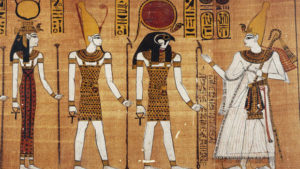Ex. 3:19-20: “But I know that the King of Egypt will not let you go unless compelled by a mighty hand. So I will stretch out my hand and strike Egypt with all the wonders I will do in it; after that he will let you go.”

The subject came to our evaluation facility after being fished out of the Nile River. In spite of those somewhat humiliating circumstances he did not seem humbled, or aware of his status. He refused to state his given name, even when offered a multiple-choice test [Please check one. My name is a) Rameses II, b) Ptolemy I, c) Aten III]. Instead he insisted upon being addressed by his title. After a brief consultation, the staff decided not to remind him he was by no means first or last of that title. It is an unfortunate tendency of those kings to identity with their own pantheon—not merely as a representative of the gods but as a god himself (cf. Isaiah doc., 14:17).
The subject was asked to give his version of events. He unfolded a grandiose drama of heroic resistance in the face of overwhelming odds: blood, hail, swarms of gnats and flies, thick darkness, etc. He insisted that through it all, his will held firm. The few times he appeared to waver and make concessions were only strategic retreats.
Examiner: How would you describe yourself at this point?
Pharaoh: Strong. Firm. In spite of obstacles and blows.
Ex: “Bloody but unbowed”?
Ph: (pleased with the terminology) Exactly.
Ex. What made you finally release the Hebrews?
Ph. What made me? Nothing made me. They crept out like skunks.
Ex. Didn’t you receive a shock in the night? Wake up to wails and screams?
Ph. What do you mean?
Ex. Can you tell me who this is?
The subject was shown an image of his son, the crown prince. After one glance, he turned away. It might be more accurate to say he recoiled.
Ex. Sir? Can you tell us?
Ph. I hate him.
Ex. Excuse me?
Ph. I do not excuse you, or your wretched, spiteful deity.
Egypt is my land. He had no business—
Ex. What are your thoughts about this statement:
For this reason I raised you up, that I might show my power in you,
and that my name—
Ph. Stop! (pause) He’s a liar.
The man’s countenance twisted until it resembled one of the demons, which was rather unsettling.
Ex. One moment please.
After a whispered conversation, the Examiner returned and placed a document on the table.
Ex. I am authorized to read you the part of the official record in which
our supervisor revealed his plans ahead of time to his servant Moses:
You shall speak all I command you and your brother Aaron shall tell Pharaoh to let the people of Israel go out of his hand. But I will harden Pharaoh’s heart, and though I multiply my signs and wonders in the land of Egypt, Pharaoh will not listen to you. Then I will lay my hand on Egypt and bring my hosts, my people the children of Israel out of the land of Egypt by great acts of judgment. The Egyptians shall know that I am the LORD, when I stretch out my hand against Egypt and bring out the people of Israel from–*
The subject rose to his feet, snatched the document, and stomped on it. Not content with that, he jumped up and down on it, raging incoherently. His words below are approximate, delivered in sputtering syllables:
Ph. NO ONE raised me up! I am born of the Sun God Ra,
whose bright blood runs in my veins!
The subject was physically restrained. After some moments evaluation continued.
Ex. Can you say your heart has softened at all?
Ph. What?
Ex. In our experience, all human hearts are in need of softening,
but yours shows a remarkably resistant composition—
Ph. Of course it’s remarkable! Everything about me is remarkable!
Ex. We mean, the LORD provided additional rigidity for his own purposes,
but you were already—
Ph. That was not ‘the Lord’! That was me!
Ex. Our record shows—
Ph. Let me see that.
He turned the now-rumpled document on the table and searched its columns.
Ph. There! You see? Here, and here and here: “Then Pharaoh hardened his heart.”
The phrasing is slanderous, though. It should read,
“Then Pharaoh displayed his iron will.” Do you have a stylus?
Ex. Er . . . No. The record will stand.
It shows that you had ample opportunity to repent but declined to do so,
which we attribute to an obstinate refusal to yield to any authority outside yourself.
That is not remarkable. Now, if you will step this way for further processing . . . .
The subject had not yet had his say, but with the application of moderate force he was sent below to the office of the Accuser, who had sufficient means to fire his heart to a coal.

Conclusion: This office has received complaints that the subject was not treated fairly but rather used as a pawn in the contest of “the gods.” Let the record show that the subject possessed rich reserves of pride and obstinacy, intensified by his position (for which he could take no credit), and susceptible to the process our superior calls “hardening.” His will, freely operating, fit within a greater Will.
Justice is served.
*Exodus 7:2-5



 After the shooting of Michael Brown in Ferguson, MO, blew the lid off race relations, three black men wrote books. The first, published only a few months after Ferguson, was Between the World and Me by Ta-Nehisi Coates. Kudos to Mr. Coates for using the grammatically-correct pronoun in his title (“between the world and I” is one of my grammar peeves), but once past the title page his thoughts are disturbing, especially to white readers. He writes out of an upbringing and experience that’s unique to the United States: that of a race of people who were once enslaved and forever after live at the mercy of white overlords who can’t stop thinking of themselves as overlords.
After the shooting of Michael Brown in Ferguson, MO, blew the lid off race relations, three black men wrote books. The first, published only a few months after Ferguson, was Between the World and Me by Ta-Nehisi Coates. Kudos to Mr. Coates for using the grammatically-correct pronoun in his title (“between the world and I” is one of my grammar peeves), but once past the title page his thoughts are disturbing, especially to white readers. He writes out of an upbringing and experience that’s unique to the United States: that of a race of people who were once enslaved and forever after live at the mercy of white overlords who can’t stop thinking of themselves as overlords. injustice. Dyson’s key term is white innocence, the bland assumption he ascribes to mainstream majority: everything is okay now and racism is over even if we can’t help thinking of our black neighbors as lazy and violent and the n- word always lurks at the back of our minds. After finishing the book, it struck me: I don’t think Dyson ever mentioned Jesus, except once or twice, in passing. That’s what I missed.
injustice. Dyson’s key term is white innocence, the bland assumption he ascribes to mainstream majority: everything is okay now and racism is over even if we can’t help thinking of our black neighbors as lazy and violent and the n- word always lurks at the back of our minds. After finishing the book, it struck me: I don’t think Dyson ever mentioned Jesus, except once or twice, in passing. That’s what I missed.











